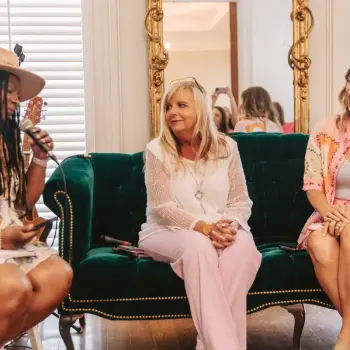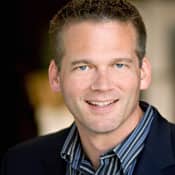So unlike the traditional teachings of 'no attachments', which was the goal, we move into re-engagement? How do we do that?
In order to engage what I call the evolutionary impulse, we have to let go of our attachment to personal fear. We are talking about the shift of identity from a psychological self to a non-dual realization where we realize that who we are is not separate from the creator or the energy and intelligence that give rise to the creative process.
And we know now that in the evolutionary process a creative process is awakening into itself or realizing itself through the highly evolved capacity for consciousness. Self-reflective awareness is really a filter, but with the mind of self-reflective circuitry through which the energy of intelligence created the universe, it can consciously engage with the process as itself.
While traditional mysticism tells us that the most appropriate relationship is to be free, this evolutionary approach to spirit liberation compels us to get right into the middle of the creative process that's speeding up and to endeavor to the best of our abilities, in some small but significant way, to give some direction to where we are going, to take responsibility for where we all headed, for the direction we are all going in.
You imply that that force could go awry, that a person or being that didn't have a highly developed soul could affect the very path of conscious evolution.
When an individual awakens to an impulse, they experience its power and its drive, but it's going to be modified and felt through the level of cognitive development, to law development and spiritual soul development in that particular individual. So if an individual who has pathological tendencies and knowledge awakens to this kind of drive, the result will be quite frightening. When that same impulse is awakened in an individual who is cognitively highly developed and morally very developed, it has a very different expression. There are many historical examples. In the first half of the 20th century, the ravages of communism and the ravages of national socialism or fascism were two radically failed experiments in utopian experiment.
There has subsequently been a backlash of enormous cynicism against any kind of utopian or idealistic vision. Nevertheless, I think that the greatest positive leaps in cultural development have all happened through individuals who have been driven by the very same evolutionary impulse.
So, for example, great leaps in science, in art, or in morality—for example, the civil rights movement—have come through individuals who were driven by the vision of what was possible. When we see this, we begin to see human progress as a spiritual process.
Who is this book written for? And what do you want those people to do with these ideas? And if they do what you hope, what do you think will happen?
I believe the ones reading this book are the luckiest, most privileged people in history, those who are living on the edge. I am a 55-year-old baby-boomer, and we have been able to take for granted a standard of living that the kings of history could never have imagined, a level of education, access to information, and a freedom of thought and movement that's historically unprecedented.
And most of us can more or less do anything that we want to do. And yet, we don't see our privileges and our freedoms in historical context; we don't realize how lucky we are. I call it The Postmodern Predicament, but many of us in spite of our good fortune feel isolated, somehow trapped within this psychological process, trapped in a cultural narcissism, and very separate from each other.
So, teaching like this really is absolutely designed to liberate all of us because it helps us to discover our sense of place, our sense of location in the cosmos. We suffer from a sense of conscious and unconscious existential isolation and confusion, not only to who we really are but as to why we are here and what is it that we are actually supposed to be doing in the world.
It's also for those individuals who realize postmodernism is dead, who realize that we need a way forward and that the postmodern values are not giving us the answers that can make sense out of this human experience and not telling us how we are supposed to live this human experience in a way that really makes very deep sense.
Now expand a little bit about what you want them to do with this teaching or this new knowledge or this realization of their role in evolution of enlightenment?
Well, I mean, I am very idealistic person you know, I am a Utopian, I am an Unapologetic Utopian idealist. I don't consider myself to be naïve; I feel like I am a very rational person. But I'm very interested in helping to catalyze a cultural evolution along the lines of what happened in the 1960s.





